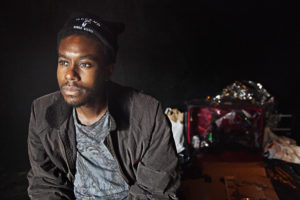You have no items in your cart. Want to get some nice things?
Go shopping
“This is my house. I built it with my bare hands,” says Ringo, gesturing to the pile of boxes, bags and trinkets behind him. Ringo (Reice Weathers) is a homeless refugee who, in an hour-long monologue, slowly reveals how he was taken from his home aged 14, given a uniform and a gun, and thrown into a war he didn’t sign up for. Forced to do things he didn’t understand.
This play may not have been written with current events in mind, but it feels very timely in light of recent anti-immigration rhetoric. Director Edwina Strobl’s version of Boxman is about a refugee from Sierra Leone who lives in a box around Elephant and Castle, but the original version by Australian playwright Daniel Keene (which premiered in 2011) was created for a Nigerian character who was staying in a shelter in Footscray, downtown Melbourne.
It’s clear from the play’s genuine emotion and the rich detail of Ringo’s back story that Weathers and the creative team spent time speaking to refugees. Flugelman Productions worked alongside Refugee Action to develop the play, and Ringo’s character is partly inspired by a refugee from Sierra Leone named Issa Thullah, whose own experience of war as a child helped Weathers visualise his character’s past.
While The Jungle shed light on life as a new refugee in the camps which followed the 2015 refugee crisis, Boxman shows us the reality of what happens when traumatised people are not offered support by the country they worked so hard to get to. Weathers gives a versatile, convincing performance as a troubled but likeable character. He jumps from running around the stage reliving childhood games to quietly telling us about his traumatic experiences.
Boxman is a multi-layered character study which forces us to listen to and care about a character we’ve all seen and avoided: the guy sitting in the park talking to himself, or sleeping in a box under the bridge. The script reads as a conversation, and Weathers frequently engages the audience by talking to us directly.
The lighting, sound and staging add to the idea that we have actually stopped on the street to talk to this person. The lighting becomes lighter and darker to reflect the different times of day. The sounds of birds, cars, rain and talking mimics what you would hear on a typical street. These everyday noises reinforce the idea that this is a real person who you may have walked by the other day and not given a second thought.
Ringo repeats that he’s lived many lives throughout the play, and the script reflects that. It includes rich descriptions of his early life before he was taken to war. It grazes the traumatic memories of his life as a child soldier, of which he can only remember parts, like running in the middle of the night, seeing his friends die, walking home for days only to find an abandoned house.
The script also explores Ringo’s experiences of coming to this country and being detained. “I know there is a stamp. A stamp that will let me live here,” he says. We learn about Ringo’s daily life. How the police named him Ringo because they can’t pronounce his real name and ask him to move on from various places. How he feels he is losing his mind, but is self-aware enough to question whether that means he’s actually sane. “If I was crazy, wouldn’t I not think I was crazy? I would just be crazy,” he says. While Ringo sings, jokes and appears quite outgoing, he reveals that he is slowly becoming a hermit. He doesn’t feel able to deal with people anymore.
Ringo feels haunted by the ghost of his child self; a shadow that watches him from a distance. Ringo describes how he wants to sew the shadow back onto himself like Peter Pan. Ringo’s frequent descriptions of how he feels he is being watched by his former self show how he feels his childhood was ripped away. How he can’t fully come to terms with all that has happened, so he sees his childhood memories as somehow separated from himself. How he can’t escape his past.
The script strikes a good balance between comedy (“Some people don’t like me being here, they think I ruin the scenery. I think I add to the scenery”) and tragedy (“Couldn’t they see that even if we fought like soldiers, we died like children?”). Flugelman Productions clearly wants us to understand that there are people like Ringo all around the UK and the rest of Europe, but they do well not to make it feel like a public awareness campaign. Instead, the script allows Ringo and the numerous real-life people he is inspired by to speak for themselves.
Boxman will play at The Other Place, Vetnor, Isle of White on 12 August as part of the Vetnor Fringe.
Boxman was developed in partnership with Refugee Action, a charity that helps refugees rebuild their lives in the UK. Find out more here.
About Sophia Moss
Sophia Moss is a theatre reviewer for The Upcoming and The Reviews Hub. Also freelances for Prospect magazine, Ethiad Atlas, Sticky Content and The Sun.




